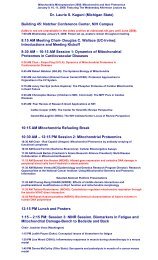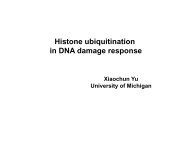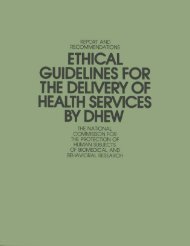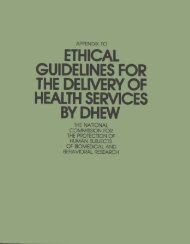RESEARCH ON THE FETUS - National Institutes of Health
RESEARCH ON THE FETUS - National Institutes of Health
RESEARCH ON THE FETUS - National Institutes of Health
Create successful ePaper yourself
Turn your PDF publications into a flip-book with our unique Google optimized e-Paper software.
fetus but also women and fetuses as a class, and should therefore be encouraged<br />
actively.<br />
The Commission, in making recommendations on therapeutic and nontherapeutic<br />
research directed toward the pregnant woman, (Recommendations (2) and (3)), in<br />
no way intends to preclude research on improving abortion techniques otherwise<br />
permitted by law and government regulation.<br />
3. Nontherapeutic research directed toward the fetus in utero or<br />
toward the pregnant woman poses difficult problems because the fetus may be<br />
exposed to risk for the benefit <strong>of</strong> others.<br />
Here, the Commission concludes that where no additional risks are imposed<br />
on the fetus (e.g., where fluid withdrawn during the course <strong>of</strong> treatment is used<br />
additionally for nontherapeutic research), or where risks are so minimal as to<br />
be negligible, proxy consent by the parent(s) is sufficient to provide protection.<br />
(Hence, the consent <strong>of</strong> the woman is sufficient provided the father does not<br />
object.) The Commission recognizes that the term "minimal" involves a value<br />
judgment and acknowledges that medical opinion will differ regarding what constitutes<br />
"minimal risk." Determination <strong>of</strong> acceptable minimal risk is a function<br />
<strong>of</strong> the review process.<br />
When the risks cannot be fully assessed, or are more than minimal, the<br />
situation is more problematic. The Commission affirms as a general principle<br />
that manifest risks imposed upon nonconsenting subjects cannot be tolerated.<br />
Therefore, the Commission concludes that only minimal risk can be accepted as<br />
permissible for nonconsenting subjects in nontherapeutic research.<br />
The Commission affirms that the woman's decision for abortion does not,<br />
in itself, change the status <strong>of</strong> the fetus for purposes <strong>of</strong> protection. Thus, the<br />
same principles apply whether or not abortion is contemplated; in both cases,<br />
only minimal risk is acceptable.<br />
Differences <strong>of</strong> opinion have arisen in the Commission, however, regarding<br />
the interpretation <strong>of</strong> risk to the fetus-to-be-aborted and thus whether some<br />
experiments that would not be permissible on a fetus-going-to-term might be<br />
permissible on a fetus-to-be-aborted. Some members hold that no procedures<br />
should be applied to a fetus-to-be-aborted that would not be applied to a<br />
66











